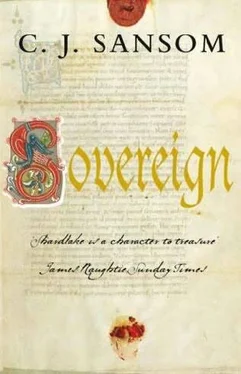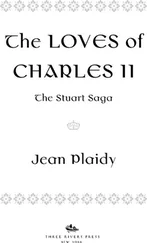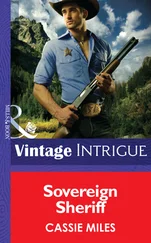‘He was very old indeed. I did not tell you, for I feared it would be dangerous for you to know.’ I laughed bitterly. ‘But of course you knew already, better than anyone.’
Giles sat up, and now I saw something fierce spark in his blue eyes. ‘The truth is dangerous for you to know, Matthew. Believe me, and ask no more questions. Stop while you can. Let me walk out of your house, now. You will never see me again.’
‘It is too late for that.’
He sat back, his mouth tightening as I went on.
‘I remembered Howlme, your parents’ grave. I am blessed with a good memory, Giles, blessed or cursed. The name of your father, whom you told me you resemble, was Edward. Born in 1421, from his gravestone. Near fifty when you were born, you said you were the child of his old age. He would have been old enough to sire a son in 1442, when King Edward IV was born. I think Edward Blaybourne was your father.’
Giles answered simply. ‘Yes, he was. King Edward IV was my much older half-brother. Henry VIII is my great-nephew. When I saw him at Fulford, saw the evil in his face, smelt his foul smell, I knew he was the Mouldwarp and it made me sick to think that creature was of my blood. This false King, whose grandsire was the son of an archer.’
‘When did you first know?’
‘I will tell you, Matthew.’ He still spoke quietly, though his eyes burned. ‘Perhaps then you will understand and forgive my abuse of your friendship. Understand that what I have done was right.’
‘Tell me, then.’ My voice came cold and sharp.
‘My childhood was happy, as I told you that evening by Howlme church. I knew my father had come to the district many years before I was born. I imagine then he was a man much like young Leacon. Tall and strong, fair and comely. He would never say where he came from, only that it was far beyond Yorkshire. I never gave thought to the possibility that our name, Wrenne, might have been assumed.’
‘That is easy to do, take a new name in a new place.’
‘Shortly after he came to Howlme and bought the farm, my father married a local woman. They were childless and when they were in their forties she died of consumption. There is much of it in those marshes. A year later he married my mother. I was their only child.’ He took a bread roll and began kneading it between his big fingers. ‘When I was sixteen I went to London to study law. At Christmas of the following year I came home to visit. That was in 1485. Four months previously the future father of King Henry VIII had beaten Richard III at Bosworth and taken the throne as Henry VII.
‘I found my father on his deathbed.’ For a second his voice faltered. ‘He told me he had first felt a lump in his side the year before, and had gradually become iller and weaker.’ His hand went, unconsciously, to his own side. ‘He had been to a physician who told him there was nothing to do but prepare for death. I wished he had told me earlier but I think, like your father, he did not want to disturb my new life far away in London.
‘I remember the night he called me to his sickbed. He was near the end then, his big strong body half melted away. The road I am following him down now.’ He looked at the remains of the little loaf, almost crumbled away. ‘It was a still night, snow thick on the ground, everything silent. He told me he had a secret, a secret he had kept hidden over forty years. He wanted to dictate a confession. Shall I tell you what it says?’ As he spoke Wrenne’s hand went to his doublet, touching his pocket. I made out something there. He saw my glance and his expression hardened.
‘Yes,’ I said. ‘Tell me.’
‘It relates he was born Edward Blaybourne, the son of a poor family of Braybourne in Kent. Like many such boys he went into the King’s service as an archer. Those were the last years of the French wars, Joan of Arc had been burned and all France had risen against us. My father was sent to garrison duty in the town of Rouen in the year 1441. The Duke of York, who was leading the campaign, was away fighting, and my father joined the guard in attendance upon the duchess.’
‘Cecily Neville.’
‘Yes. The duchess was young, lonely, afraid in a strange and hostile country. She befriended him and one night he ended in her bed. One night, that was all it was, but enough for her to fall pregnant. When she found out she decided to say the child was her husband’s; she would pretend it had been conceived before the duke went away and when it was born she would say it was overdue. The duchess could have had him killed but instead she sent him away, with enough money to start a new life, coins in a decorated jewelbox -’
‘The box-’
‘Yes. And an emerald ring she used to wear.’ He raised his hand. ‘My father always kept it and he gave it to me that night. I have worn it ever since.’
He paused. I heard the rain hammering down, harder than ever, as though it would force a way through the walls. ‘Why did Cecily Neville not produce your father as evidence when she confessed to what else she had done in 1483?’
‘She had no idea where he was. My father did not hear the news until months later.’ He sighed again. ‘That winter night my father was in an agony of soul. All his life he had felt he had committed a terrible sin, been responsible for a man taking the throne who had no right to be King. He hid his feelings well under a hearty veneer, as I have learned to do. But when his son King Edward died and Richard III seized the throne he was overjoyed, for Richard was the true son of Cecily Neville and Richard Duke of York, entitled to the succession by virtue of the blood royal. But then Richard was overthrown and Henry Tudor seized the throne. He had only the thinnest stream of royal blood and he married Edward IV’s daughter to strengthen it. You remember the family tree?’
‘Yes. Elizabeth of York that married Henry VII, and is the mother of Henry VIII, was in truth the granddaughter of Edward Blaybourne.’
‘My niece. And the Princes in the Tower were my nephews, not King Richard’s. So by an irony of fate Henry VII had not strengthened his family’s claim, but weakened it beyond measure. That sore afflicted my father. He felt his dreadful illness was a punishment by God.’ Wrenne took a deep breath. ‘He made me swear that night, on the Holy Bible, that if ever a right time came to use his confession to bring the true line back to the throne, I would use it.’
‘Yet you have waited fifty years.’
‘Yes!’ He spoke with sudden passion, leaning forward. ‘Yes, I did nothing, I watched as the Tudors ruined Yorkshire. Watched as the present King, the Mouldwarp as he truly is, stole the lands and positions of the old Yorkshire families, replacing them with common rogues like Maleverer. Watched as he destroyed the monasteries, perverted our faith, stood by as the enclosers took the people’s land. Stood by, in the early years at least, because I did not believe my father’s story!’
He spoke with fierce passion and I saw that he felt a guilt about his father far worse than anything I felt about mine.
‘I could not believe so fantastic a tale at first. But I set myself to seek out the truth, to trawl in old and forbidden papers to find if it could be true. It took me years, years of ferreting out old books, manuscripts, pictures. Some of them forbidden.’
‘So that was how you became an antiquary and built that astonishing library.’
‘Yes, and found I loved the work for its own sake so that in the end it became a pastime rather than what should have been, a mission. It was hard, the Tudors hid traces of the Yorkist legacy well.’
‘They knew all along, though, didn’t they? The King knows he has no right to the throne.’
‘Oh, yes. The King and his father have always known that. But no doubt they convinced themselves they were each entitled to keep it. Those who have power do not give it up readily. And such power this King has.’ He was silent for a moment, then resumed in a quieter tone.
Читать дальше












